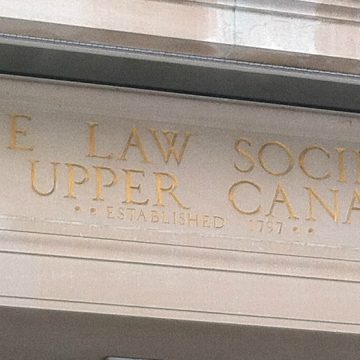Today, the Law Society of Upper Canada voted not to accredit the proposed law school at Trinity Western University, a B.C.-based Christian school that forces students to sign a community covenant that bans same-sex intimacy.
In the end, benchers voted 28 to 21, rejecting TWU’s proposal for a law school.
The decision means Trinity Western law graduates will not be permitted to article nor practise law in Ontario.
Still, after the vote, TWU President Bob Kuhn said the school would go forward as planned, with classes set to start in September of 2016.
The school has earned approval from the Federation of Law Societies and the Law Society of B.C., so future gradates will be able to practise in British Columbia — although, a petition is in the works that could force the Law Society of B.C. to reconsider its decision at a special meeting.
Today’s vote took place after a full day of debate at LSUC, which began with a one-hour statement by Kuhn. During that time, he defended the school’s covenant, insisting it is protected by freedom of religion.
“Doesn’t each religious community get to determine the religious views and moral standards to which they have historically held to be true?” he asked the benchers. “Or, are we going to have someone dictate what is acceptable in public spheres?”
He said that, as long as TWU has a rigorous curriculum, it would be discriminatory to deny the school accreditation solely on the basis of its community covenant.
But several benchers, such as Malcolm Mercer, argued that LSUC had to consider a broad range of legal issues — not just the quality of the education.
In particular, he said the Law Society has to ensure a legal education is accessible to all Canadians. Thus, he said, LSUC should not accredit a law school that does not permit same-sex intimacy because it would create a path to licensing that excludes some members of society.
At a press conference following the debate, Janet Epp-Buckingham, an associate professor at TWU responded to that objection.
“Some people view the university as somehow excluding people from the process, where we view it as an opt-in process,” she said. “We think we are adding pluralism and diversity, not taking away from it.”
During today’s debate, benchers also insisted that the community covenant is inconsistent with basic human rights.
“I cannot accept that it would be in the public interest to accredit a school that seeks to control students in their bedrooms,” said bencher Howard Goldblatt.
Even benchers who voted to approve the school expressed their personal opposition towards Trinity Western’s community covenant.
For instance, bencher Christopher Bredt voted to approve TWU’s law school, but said, “My role is to apply the law regardless of my personal views.”
Bredt also suggested that not accrediting the law school would be meaningless because, in the end, TWU graduates could become lawyers by applying to the National Committee on Accreditation, which decides whether graduates from international law schools can practise in Canada.
But LSUC Treasurer Thomas Conway quickly made it clear that the NCA has the authority to evaluate international law students — not graduates from non-accredited Canadian law schools.
Today’s vote marks the first time that the Law Society of Upper Canada has rejected a proposal for a Canadian law school.


